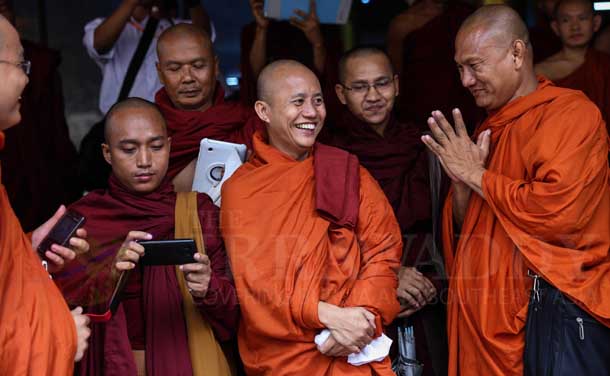RANGOON — Senior Buddhist leaders told a large monks’ conference on Thursday that they support a controversial draft law that would put restrictions on marriages between Buddhist women and Muslim men.
The monks said they would pressure Burmese lawmakers into accepting the bill, which was first proposed at a conference earlier this month with the support of ultra-nationalist monk U Wirathu.
About 1,500 monks from all over Burma gathered at a monastery in Rangoon’s Insein Township on Thursday in order to discuss how to resolve ongoing tensions between Buddhists and the country’s Muslim minority.
Senior monks who spoke at the event, which was the largest gathering of monks in Burma in many years, urged the Buddhist clergymen to rally behind their draft Law for the Protection of Race and Religion.
This bill includes a set of rules that would supposedly strengthen and protect Burma’s Buddhist tradition.
The draft law also requires any Buddhist woman seeking to marry a Muslim man to first gain permission from her parents and local government officials. Any Muslim man who marries a Buddhist woman is required to convert to Buddhism.
At a press conference on Thursday evening, three monks presented the senior monks’ decision to unite behind the proposal.
“The bill has been endorsed,” said U Sanda Siri, a monk from Kachin State, adding that legal experts would conduct a final review of the draft law before it is sent to lawmakers in Naypyidaw.
He said the monks would gather signatures from the public in support of the bill to pressure lawmakers to pass it into law.
U Wimala Buddhi, a monk from the Mon State capital Moulmein, warned that the clergymen would discourage voters from supporting any parliamentarian who does not back the law. “I want to know who will oppose our law, which political parties,” he said during a speech.
U Nyanissara, one of the most respected Buddhist monks in Burma, urged the monks to unite against supposed external forces, although he stopped short of endorsing the controversial bill.
“To protect our race and religion, we should speak with one voice,” he said in a speech, “The government also has an important role to play.”
The bill on interfaith marriage was first presented at a smaller monks’ conference in Hmawbi Township in mid-June in the presence of nationalist monk U Wirathu, who said that he had “dreamed of this law for a long time.”
The radical monk leads the nationalist ‘969’ movement, which calls on Burma’s Buddhist majority to shun Muslim communities, and to only support Buddhist-owned businesses. It has been accused of stirring up deadly violence between Buddhists and Muslims, which has killed about 250 people and displaced some 150,000 people, mostly Muslims, in the past year.
At its presentation in mid-June, the draft law sparked a flurry of reactions, with some Muslim leaders pointing out that it was a flagrant violation of basic human rights. Burmese women’s rights groups have vowed to campaign against the proposal.
The Universal Declaration of Human Rights Article 16 states that “Men and women of full age, without any limitation due to race, nationality or religion, have the right to marry and to found a family.”
Senior monk U Dhammapiya insisted nonetheless that the law would “protect Buddhist women’s rights” and he dismissed the idea that the bill would violate human rights principles. “There are different human rights conditions in different countries,” he said during a press conference.
U Wirathu also attended Thursday’s event. He kept silent about the draft law but as he walked through conference many monks showed high respect to him.
In the past few days, the nationalist monk has been at the center of controversy after his photo appeared on the cover of Time magazine’s July 1st issue with the headline “The Face of Buddhist Terror.” The cover caused an uproar in Burma because some felt it coupled the country’s Buddhist tradition with terror and violence.
On Thursday, U Nyanissara also spoke out against Time’s cover and appeared to defend U Wirathu.
“They say the Buddhist religion is carrying out genocide, but we did nothing, not even expand our population,” he said. “Ashin Wirathu is a person who shows tolerance when someone criticizes him.”
U Nyanissara, a highly revered monk in Burma, urged the gathered clergymen to unite and stay calm in the face of such outside criticism, saying, “Our Buddhist clergy here is as strong as the Burmese army; we have 500,000 monks.” The Burmese military has some 400,000 troops.
Win Tin, a senior member and co-founder of the National League for Democracy, Burma’s largest opposition party, said in a reaction that he was disturbed by the monks’ proposal.
“It’s all developing rather ugly… All these proposed laws would worsen the situation,” he said, adding that the clergymen should not enter the field of politics in order to get laws passed that would put restrictions on ordinary people’s lives.
“The first thing is, it should not be initiated by the Buddhist monks,” he said. “These are issues for individuals, whether they are Buddhist or Muslim. These are family matters. There should be no legal obligations at all.
“This doesn’t need to be put to Parliament at all, this is my opinion.”
Additional reporting by Paul Vrieze.

















